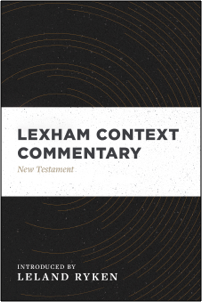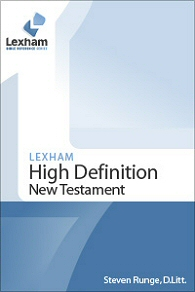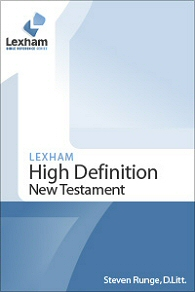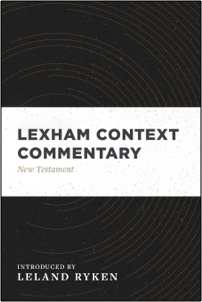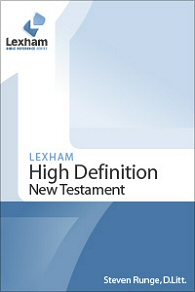The New Testament writers used a variety of literary and grammatical devices to help guide the reader. Some of these devices were intended to attract attention to important information, while others served to push less-important information into the background. Some were used simply to grab your attention, alerting you that something important or surprising was about to happen.
26 But Peter lifted him up, saying, “Stand up; I too am a man.”
27 And as he talked with him, he went in and found many persons gathered.
28 And he said to them, “You yourselves know how unlawful it is for a Jew to associate with or to visit anyone of another nation, Sentence but God has shown me that I should not call any person common or unclean.
29 So when I was sent for, I came without objection. I ask then why you sent for me.”
30 And Cornelius said, “Four days ago, about this hour, I was praying in my house at the ninth hour, and behold, a man stood before me in bright clothing
31 and said, ‘Cornelius, your prayer has been heard Sentence and your alms have been remembered before God. Principle
32 Send therefore to Joppa and ask for Simon Sub-point who is called Peter. He is lodging in the house of Simon, a tanner, by the sea.’
33 So I sent for you at once, and you have been kind enough to come. Now therefore we are all here in the presence of God to hear all that you have been commanded by the Lord.”
Runge, S. E. (2008–2014). The Lexham High Definition New Testament: ESV Edition (Ac 10:26–33). Lexham Press.
Faithlife Study Bible (FSB) is your guide to the ancient world of the Old and New Testaments, with study notes and articles that draw from a wide range of academic research. FSB helps you learn how to think about interpretation methods and issues so that you can gain a deeper understanding of the text.
10:25–43 This passage describes the culmination of Cornelius’ and Peter’s visions, leading to the full incorporation of a large group of non-Jewish people (Gentiles) into the Christian community.
10:26 also a man Describes Peter’s refusal to be considered superior to Cornelius (compare 14:15).
10:28 forbidden While no specific ot law forbade interaction with non-Jewish people (Gentiles), the purity laws often meant Jews limited interaction with Gentiles in order to remain ritually pure.
common or unclean Peter’s presence in Cornelius’ home with the many Gentiles gathered there shows that he finally realizes the full implication of his vision (see note on v. 14).
Barry, J. D., Mangum, D., Brown, D. R., Heiser, M. S., Custis, M., Ritzema, E., Whitehead, M. M., Grigoni, M. R., & Bomar, D. (2012, 2016). Faithlife Study Bible (Ac 10:28). Lexham Press.
The Lexham Context Commentary: New Testament surveys each book of the New Testament at several levels—Book, Division, Section, Pericope, Paragraph, and Unit—providing contextually appropriate commentary on each level. The reader of the commentary can easily ascertain the contextual importance of any larger section, or pericope, or even a particular verse of Scripture.
Gentiles Receive the Holy Spirit (10:1–11:30)
A centurion and Godfearer named Cornelius receives a vision that instructs him to request that Peter come to his home (10:1–8). Peter receives visions that prepare him to receive the hospitality of Cornelius (10:9–16). The Spirit instructs Peter to accept Cornelius’ invitation (10:17–23). Cornelius is prepared for Peter’s arrival (10:24–33), where Peter preaches Jesus (10:34–43), and Cornelius and his household receive the Holy Spirit and are converted (10:44–48). The Jerusalem church interrogates Peter, who explains how the gentiles received the Spirit (11:1–18). A church is planted in Antioch (11:19–30).
Peter Converts Cornelius and His Household (10:1–48)
This passage narrates how the angel of the Lord speaks to Cornelius in a vision, instructing him to invite Peter to his home (10:1–8). In a visionary trance, Peter refuses to eat unclean animals when commanded to do so; God declares that nothing God created is unclean (10:9–16). Still puzzled by the dream, Peter is instructed by the Spirit to accept Cornelius’ invitation to his home, and he obeys (10:17–23). Cornelius is prepared when Peter arrives (10:24–33); at Cornelius’ house, Peter preaches Jesus (10:34–43), and the entire household receives the Holy Spirit and is converted (10:44–48).
Peter Meets Cornelius (10:24–33)
Peter arrives at Cornelius’ home, where Cornelius has gathered some people to hear Peter; Cornelius attempts to worship Peter, but Peter stops him (10:24–26). Peter asks why he has been sent for, considering the prohibition against certain interactions between Jews and gentiles (10:27–29). Cornelius recounts his vision in response to Peter’s question about why Cornelius sent for him (10:30–33).
10:26 But when Cornelius starts to worship Peter (10:25), Peter resists: he helps Cornelius to his feet while insisting that he himself is a mere human being.
10:27 After Peter prohibits Cornelius from worshiping him when they first meet (10:26), Peter and Cornelius converse as they enter Cornelius’ house together, where a large number of people have gathered to hear Peter.
10:28 Cornelius and Peter are talking with each other as they enter Cornelius’ house (10:27), and Peter turns and addresses the many gentiles gathered in the house. Peter’s speech demonstrates that he now understands the meaning of his dream (10:9–16): although Jews are not permitted to mingle with other people, God has revealed to Peter that no human being is unclean or profane.
10:29 Peter shared with Cornelius and the other gentiles gathered in Cornelius’ home the reason he agreed to come (10:28). But now, now, Peter asks to hear directly from Cornelius and the other gentiles why they invited him (10:21–22).
10:30 This verse begins Cornelius’ reply to the question Peter raised about why the gentiles have invited him (10:29): Cornelius recounts how a divine being appeared to him four days ago while he prayed at three in the afternoon; a man wearing bright clothing suddenly stood before him (10:3–4).
10:31 This verse continues Cornelius’ explanation for inviting Peter to his home and reports the angel’s first words to him (10:29–30): the angel told Cornelius that God has heard his prayers and is aware of his generosity toward the poor.
10:32 Continuing to answer Peter’s question (10:29–31), Cornelius recounts the angel’s instructions to him: the divine messenger instructed Cornelius to send for Simon Peter, who is visiting with Simon, a local tanner, who lives near the sea in Joppa.
10:33 After recounting the angel’s words to him in a vision (10:1–32), Cornelius reports how he immediately obeyed the angel’s directive and reveals to Peter their expectation now that Peter has graciously come: they are gathered at Cornelius’s house in God’s presence to hear through Peter what God has to say.
Mangum, D., ed. (2020). Lexham Context Commentary: New Testament (Ac 10:1–11:30). Lexham Press.


